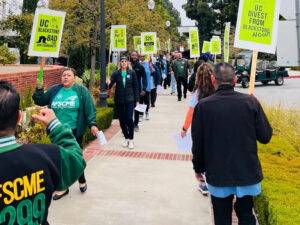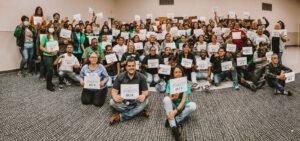
AFSCME Local 3299 is the UC’s largest employee union, encompassing over 30,000 Service Workers, Skilled Craft Workers, Patient Care Technical Workers, and more. They encompass all 10 of the University of California campuses including clinics, laboratories, and medical centers.
What fallows is an interview by Alyce Thornhill with Nicolas Gutierrez, a Member Action Team Leader with Local 3299 AFSCME. This interview was originally aired on May 1st, 2023, and details ongoing student and worker struggles, specifically AFSCME’s current “25/5” campaign.
Nicolas Gutierrez
My name is Nicolas Gutierrez. I’ve been working here since 1994. I’m going on 30 years this June. And I’m what you call a Member Action Team Leader with Local 3299 AFSCME.
Alyce Thornhill
And what is your profession at UC Santa Cruz?
N.G.
I’m a senior custodian here at UC Santa Cruz.
A.T.
Nice, and how long have you been doing that job?
N.G.
For 29 years, plus.
A.T.
Wow. I remember you mentioned at the AFSCME rally we were both at that your starting salary was at $9, right? And you’ve been fighting ever since for a higher wage?
N.G.
Yes, back in 1994. I started working here for $9.85. And it’s been a constant battle, you know, trying to go up in wages. It always has to be through a contract fight. Because the University, they don’t give anything for free. We usually have to take it from them. So during my time here, I’ve been through five contracts fights.
The University, they don’t give anything for free. We usually have to take it from them.”
A.T.
Wow. How has the cost of living changed in those years that you’ve been here? Have you noticed a huge change in inflation?
N.G.
I’ve seen it raise over time since I’ve been here. Homes have gone up in the last 23 years, from about 300,000 to well over a million here in Santa Cruz. That’s also another reason why we’re in our current fight that we’re in right now, because of such a high cost of living.
A.T.
Something you mentioned during the AFSCME rally that happened just a few weeks ago was that much of the faculty in custodial work and transportation services has to commute from far distances such as Watsonville.
N.G.
We have a lot of workers that come as far as Soledad, Salinas. There’s people that come from Hollister, Los Banos, San Jose, because of how expensive it is here in the area. And it kind of seems to be this case for any UC campus or UC medical, wherever those are located, that it drives the housing costs up more. You know, so it’s really difficult to be close to where one works.
A.T.
Do you think it’s also because they’re building so much housing for students that it’s pushing out people that have lived here for a long time?
N.G.
Yes, yes.
A.T.
So that brings us to the current fight that AFSCME is involved in and you have been involved in, which is the 25/5, which means $25 and 5%. And do you want to talk about what this campaign is about?

N.G.
You know, our union hadn’t launched a campaign like this one since 2004. The reason for it is because our contract that was won in 2019, we’ve only received a 9% from that contract, there’s still a 6% to come. But inflation since 2020, when COVID hit, inflation went up 16%. And now you can see that that 16% [compared to] the 9% that we’ve gotten from the contract, doesn’t quite make it up there. And we’ve fallen behind, you know, in a really bad situation that we’re in. This is what caused our union to start this 25/5 campaign to bring everybody up to $25, who works for UC across the state, and those of us who make 25 or more, get a 5% increase. That’s what the 25/5 is about. It’s basically a cost of living raise that we’re fighting for. UC, on the other hand, has come out and said, We gave you your 5% already, but they’re talking about the contract. This isn’t a contract fight. This is a cost of living fight.
A.T.
That’s interesting too, because I was gonna say that as a student, I’m about to graduate. But while I’ve been here, there’s been a cost of living fight for graduate students. And I’ve witnessed the fight for a contract for lectures. I was wondering, is there something particular to these past four years that you’ve witnessed? Do you feel like this movement and action has been more than usual? Or do you think it might be related to the COVID pandemic, and people are just now being catalyzed for change?
N.G.
I think it’s a little bit of both. But over the years, I’ve seen that every time that we’re gonna negotiate a new contract, that it’s gotten harder and harder to win that contract against UC, the current contract that we’re in took a year and eight months to be able to win that. And it seems that every time UC is playing harder with us, because the university knows that dollar for dollar, we can’t match them, we can’t go up against them. You know, because they’re a billion dollar corporation a year. But one thing we do have is we have the numbers, we have the workers to get out there in force and win this, right? And we do it because it’s a necessity. It’s the only way we can go up in wages and try to keep up with inflation. It’s the reason why we’re so militant and fighting every time we have to.
One thing we do have is we have the numbers, we have the workers to get out there in force and win this.”
A.T.
I think you make a great point as well about how the University is a billion dollar corporation, and always talks about how they don’t have enough money to pay their workers, when I think something that you and other organizers brought up is, all that extra money is being invested into real estate, which is driving up cost of living for all of us here.
N.G.
And not just here, but in the whole country. You know, when the university does have over $3 billion to give to a real estate company known as Blackstone, they do have the money to do the right thing for their workers, but they choose to invest in other places. And this real estate company, Blackstone, is one of the reasons why they drive housing costs so much around the state, especially around the UC campus and Medical Center. And what they’re doing is not affordable, not for workers, not for students, not for anybody, they just seem to care about making more money, making more billions of [dollars of] money. And it’s only really rich millionaire people that can afford this. And at the same time, while we’re fighting this fight, [the] UC San Diego Chancellor received a half a million dollar increase to what they were making already. I believe that our chancellor here at UC Santa Cruz just recently got a $70,000 raise. You know, the money is there. But for some reason it seems to be there only for the people in top management. It’s never there for workers.
While we’re fighting this fight, [the] UC San Diego Chancellor received a half a million dollar increase … the money is there. But for some reason it seems to be there only for the people in top management.”
A.T.
That’s something I’ve learned about in my classes, too, is how over the years, the Universities of California have shifted from being an educational institution to a business. And it seems like there’s they just keep adding more and more administrative jobs that make this giant sum of money. And those of us at the bottom are suffering.
N.G.
And they always claim that they pay out these lump sums of money to top administrators to they keep good qualified [workers] for retention. Well, what about good career workers? What about them? What about giving them a cost of living? What about making sure that they’re okay, and they’re able to make a living close to where they work? Right? Instead of having people spending three hours a day just coming and going back home from work? And on top of that workers also have to pay for parking, and students. You know, I don’t think that’s fair.
A.T.
We were just talking about that today. How multiple of my co-workers get $50 parking tickets. I don’t think our Chancellor’s have to pay for parking.
N.G.
It’s the only place that you’ll find the you’re charged for a parking slip and they don’t guarantee you’re going to find a parking spot. You can spend an hour trying to find parking up here.
A.T.
Absolutely. Thank you so much for talking about that. You briefly mentioned this, but to kind of contextualize why I wanted to share this on International Workers Day, I was doing a little bit of research about it. It originated in 1886, and it was the first time that workers went on strike for an eight hour workday. And it was interesting to me because it ended in a lot of violence, police violence, because the police were attacking these people striking. And for me, that made me think about the way that the administration has dealt with strikes over the years, and I’ve seen many of my colleagues and friends being abused and brutalized by police at the picket line for COLA, and I know that at the AFSCME rally the administration was also supposed to meet with you all and accept your demands, and there was a no show. So I’m wondering sort of how has your relationship been with administration?
You’re just a number here.”
N.G.
Over my 29 years of working here, at the beginning, when I first started working back in 94, I was real happy to have this job. Back in the day, everybody wanted to come work for UC Santa Cruz. But I’ve seen that take a change around 1999-2000, that I feel more since that time to now that top management — and when I say top management, I’m talking about like the regents and President Drake — they view us like a number. You’re just a number here. And you know, it’s fine. They can view us like that, if that’s what they choose to do. But as long as they treat us with respect, and dignity, you know? Students make me feel appreciated. And that’s all I care about, because that’s all I really truly work for. And I’ve always said in actions and rallies and strikes, that students make my paycheck. And not only mine, but also the Chancellor’s. President Drake’s . And sometimes, you know, these folks forget about that, right? Because like you said, I’ve seen them disrespect students. Look how long it took for the lecturers to win their strike, that shouldn’t happen. The university has both the power and the resources to get it done in three months, get it over with, you know, why prolong so much? Why make these people go through what they have to go through? No one likes to strike. But we’ll do it if we have to. And every time UC pushes us to do strikes. And if that’s what it takes to win a contract, you know, we prepare, we get ready, we’ll start putting money away for those strike days, because we know we’re not gonna have any pay. And UC, [during the] K7 strike, when they went out two weeks on strike, UC actually threatened them, that if they didn’t come back to work, that they were going to take away their medical benefits. And there were two, three mail workers, they had had serious illnesses, one of them had a little boy who like every week [he had to] take to Stanford. And they were ready to come back into work because they said, “Hey, you know what, I can’t do this man. If they take my they strip my medical benefits away. I’m in another world.” Thank God the politicians moved on it real quick and put pressure on the University so they wouldn’t take their benefits away. And I believe that it passed in Sacramento, it’s now law. In the future, any union out there that goes on strike with their workers, UC can no longer threaten them with taking their medical benefits away. So that was like a huge victory for for us. But you see how UC thinks and how greedy they are, right? It’s all about power. We’re not asking that we want to have the power, we just want to make a decent wage so that we can survive in this economy because everything’s expensive. In Santa Cruz, you can no longer find a home under a million dollars, you know, with a $25 an hour wage, who’s gonna buy that? Not me!
I’ve always said in actions and rallies and strikes, that students make my paycheck. And not only mine, but also the Chancellor’s.”
A.T.
It’s interesting how this cycle is working that, because of these [low] wages, we’re all forced to rent. And then, because of the UC investing in the real estate companies, the rents going up. And we’re stuck in this perpetual cycle of being oppressed.
N.G.
And companies aren’t building homes or apartments, and turning around and making them affordable for workers or students, they’re turning around and selling them for market value price. And [those of] us working here can’t afford these homes or rent these apartments. This is why we have to drive so far to come to work.
A.T.
Something that’s been really powerful for me, after attending the AFSCME rally, and I was also involved with the lecturer strike my freshman year is [that] one of the ways that the UC maintains this power is by dividing workers and students, even though a lot of us students are also workers like myself, and I think it’s so powerful to meet people like you. And it’s been such a pleasure, because it shows that this fight has been going on for so long. And I think a lot of the time, especially with the Cost of Living Adjustment [fight] for the grad student workers, it’s like the university relies on a four year turnaround rate, they wait for us to graduate and then forget about this fight, and then people have to start from scratch. I think it’s such a powerful thing to meet people like you that have been engaged in this fight for so long. It’s really, really inspiring.
N.G.
The skills trades folks that work here, K7s, they’re about to go into contract negotiations, because their contract is going to be due up pretty soon this summer. And it’d be interesting to see how long it’s going to take them to win a contract. Yeah, we’ll see how UC responds to that.
A.T.
And it’s going to happen during the summer as well?
N.G.
It’ll happen around summertime.
A.T.
It’s interesting how, I learned in one of my classes as well, that anytime the university hikes tuition up, they do it during the summer because students aren’t here to organize. So that’s interesting to me as well.
N.G.
And you mentioned how UC likes to divide and conquer. The UC always blames the unions and workers — if we had to give them a raise, you know, we’re gonna have to jack up tuition. They jack up tuition anyway! So we always tell the students that’s not true.
The UC likes to divide and conquer. UC always blames the unions and workers — if we had to give them a raise, we’re gonna have to jack up tuition … that’s not true.”
A.T.
Absolutely. I think that happened a lot during the graduate student strike, specifically in the STEM department, because that’s where a lot of the money for the University comes from. The administration was sending out emails saying your TAs aren’t on your side, they’re doing this grade strike against you. And it’s so important, I think, for us students to gain some kind of critical education and go out and be involved in strikes and actions on campus, because it’s simply not true. I think stepping outside of our own sort of lens and worlds is incredibly important in realizing that.
It’s not just about workers. It’s also about the students that are struggling just to be here … their wages will come up to $25 as well.”
N.G.
You know, the students that have always supported the unions that represent the workers here, I can see that they’re also students that are struggling to try to make ends meet, some of them live in their cars, some of them live with friends, some some say that they live in people’s garages, you know, like a house of a friend, their parents will let them stay in the garage, just so they could afford to come and study here at UC Santa Cruz. It’s most of those students who can see our struggles as workers, and they join them. So it’s not just about workers. You said it earlier. It’s also about the students that are struggling just to be here. This 25/5 fight that we’re currently in? We win this, and it is also going to be for the students that UC hires, for the students that work in service. Their wages will come up to $25 as well, because we also thought about the students, you know, those students that work at the dining halls or work for grounds or work for the maintenance departments. They’re working here because they’re trying to make ends meet too, they don’t have the luxury of having rich parents to pay for their studies. So it’s also a fight about them as well.
A.T.
I think that’s the spirit of May day and International Workers Day, is that all of our struggles are intertwined, and we’re stronger together.

